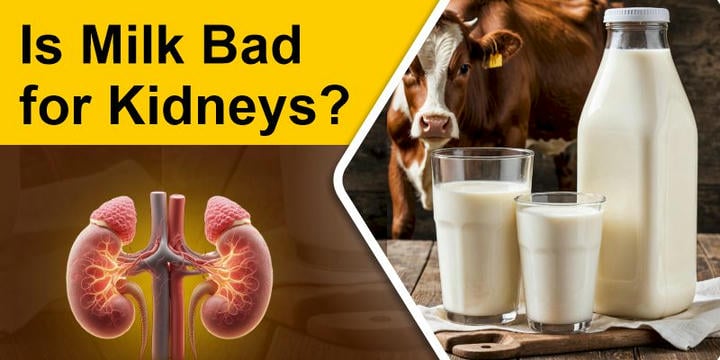
Ever wondered if sipping on that glass of milk might be a poor decision for your kidneys? Whether it's the creamy swirl in your morning coffee or the perfect companion to your bowl of cereal, milk holds a prominent place in most of our diets. But when it comes to kidney health, questions often arise - Is milk bad for kidneys or is it really safe for those delicate bean-shaped organs? Let's dive deep into this topic and uncover what science says, so you can sip smarter.
Milk offers a wholesome punch of calcium, protein, and essential vitamins, but it’s not a one-size-fits-all food, especially when kidney health is in question. For some, it serves as a nourishing drink; for others—particularly those with existing kidney conditions - milk may pose some risks. Here's why:
Milk contains phosphorus, a mineral essential for strong bones. However, in individuals with kidney disease, phosphorus builds up in the blood as the kidneys struggle to filter it out. Excessive phosphorus can lead to bone damage and calcification of blood vessels, increasing the risk of cardiovascular issues.
People with chronic kidney disease (CKD) are often advised to limit potassium intake. Milk contains moderate levels of potassium, and though it’s beneficial for heart function, too much potassium in weakened kidneys can cause hyperkalemia (dangerously high potassium levels). Hyperkalemia can trigger symptoms like muscle weakness, fatigue, and irregular heartbeat.
Although protein is vital for muscle repair and overall health, excess protein intake can burden the kidneys, especially in people already experiencing reduced kidney function. Milk and dairy products are rich sources of animal protein, which may accelerate the decline of kidney function if consumed in excess over time.
Here’s the good news - milk isn’t entirely off the table for everyone. Moderation is key. If your kidney function is normal, there’s no need to cut out milk unless advised otherwise by a healthcare provider. However, individuals with advanced kidney disease or dialysis patients need to tread carefully.
Some people opt for low-phosphorus alternatives such as almond milk, rice milk, or soy milk. These options can meet nutritional needs without overloading the kidneys with minerals. Still, it’s essential to check labels since not all plant-based milks are low in phosphorus or potassium.
If you’ve had a calcium-oxalate kidney stone, you might be concerned that milk, with its high calcium content, could trigger more stones. Interestingly, calcium from dietary sources like milk helps bind with oxalates in the digestive system, reducing the risk of stones forming in the kidneys. However, calcium supplements are a different story—they’ve been associated with a higher risk of kidney stones when taken in excess. So, sipping milk in moderation could actually help prevent stones instead of causing them.
Here are some situations where milk consumption might become problematic for kidney health:
Stage 3-5 CKD: Phosphorus and potassium regulation are critical at this stage. Regular milk may worsen imbalances.
Dialysis patients: They require strict control of fluid and mineral intake to avoid complications.
Individuals with lactose intolerance: If you’re lactose-intolerant and consume milk frequently, it may cause digestive discomfort, leading to dehydration—an indirect threat to kidney health.
If you enjoy milk but want to protect your kidneys, consider these tips:
1. Watch the portion size: Stick to ½ cup to 1 cup per day if your healthcare provider permits it.
2. Choose low-phosphorus or plant-based milk: Almond milk or rice milk can be excellent alternatives.
3. Balance your diet: Make sure your overall intake of potassium and phosphorus stays within recommended limits.
4. Consult your doctor: Always speak with a healthcare professional if you have any doubts about how much milk is safe for you.
So, is milk bad for the kidneys? Not necessarily - it depends on your health and how much you consume. For individuals with healthy kidneys, milk can still be a nutritious part of the diet. But for those managing kidney disease, careful moderation and alternative options may be better suited to maintain balance and prevent complications.
At the end of the day, your kidneys appreciate mindful choices, not perfection. It’s about tuning into your body, understanding what it needs, and making informed dietary decisions. Whether you love milk or are exploring substitutes, your kidneys will thank you for your thoughtfulness.
So go ahead, enjoy that splash of milk - just keep your kidneys in mind!
Second Floor, 77, Block C, Tarun Enclave, Pitampura, New Delhi, Delhi, 110034